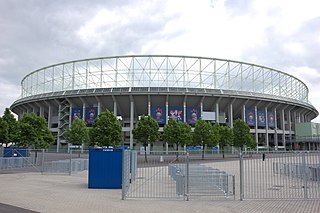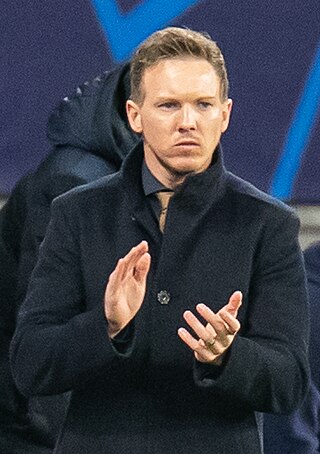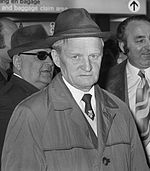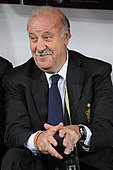
The UEFA European Football Championship, less formally the European Championship and informally the Euro, is the primary association football tournament organised by the Union of European Football Associations (UEFA). The competition is contested by UEFA members' senior men's national teams, determining the continental champion of Europe. It is the second-most watched football tournament in the world after the FIFA World Cup; the Euro 2016 final was watched by a global audience of around 600 million. The competition has been held every four years since 1960, except for 2020, when it was postponed until 2021 due to the COVID-19 pandemic in Europe, but kept the name Euro 2020. Scheduled to be in the even-numbered year between FIFA World Cup tournaments, it was originally called the European Nations' Cup before changing to its current name in 1968. Since 1996, the individual events have been branded as "UEFA Euro [year]".

The Germany national football team represents Germany in men's international football and played its first match in 1908. The team is governed by the German Football Association, founded in 1900. Between 1949 and 1990, separate German national teams were recognised by FIFA due to Allied occupation and division: the DFB's team representing the Federal Republic of Germany, the Saarland team representing the Saar Protectorate (1950–1956) and the East Germany team representing the German Democratic Republic (1952–1990). The latter two were absorbed along with their records; the present team represents the reunified Federal Republic. The official name and code "Germany FR (FRG)" was shortened to "Germany (GER)" following reunification in 1990.

The Italy national football team has represented Italy in men's international football since its first match in 1910. The national team is controlled by the Italian Football Federation (FIGC), the governing body for football in Italy, which is a co-founder and member of UEFA. Italy's home matches are played at various stadiums throughout Italy, and its primary training ground and technical headquarters, Centro Tecnico Federale di Coverciano, is located in Florence. Italy are the reigning European champions, having won UEFA Euro 2020.

The Spain national football team has represented Spain in men's international football competitions since 1920. It is governed by the Royal Spanish Football Federation, the governing body for football in Spain.

The Austria national football team represents Austria in men's international football competitions, and is controlled by the Austrian Football Association, the governing body for football in Austria.

Hans-Hubert "Berti" Vogts is a German former professional footballer who played as a defender. He played for Borussia Mönchengladbach in the Bundesliga his whole professional club career and won the FIFA World Cup with West Germany in 1974. He later managed the national teams of Germany, Scotland, Nigeria and Azerbaijan.

The Ukraine national football team represents Ukraine in men's international football, and is governed by the Ukrainian Association of Football, the governing body for football in Ukraine. Ukraine's home ground is the Olimpiyskiy Stadium in Kyiv. The team has been a full member of UEFA and FIFA since 1992.

Helmut Schön was a German football player and manager. He is best remembered for his exceptional career as manager of the West Germany national team in four consecutive World Cup tournaments, including winning the title in 1974, losing in the final in 1966, and coming in third in 1970. In addition, his teams won the European Championship in 1972 and lost in the final in 1976.

Vicente del Bosque González, 1st Marquess of Del Bosque is a Spanish retired football manager and former player. He is regarded as one of the greatest managers of all time and is to date the only football manager to have won the World Cup, the Champions League, the European Championship and the Intercontinental Cup.

EuroBasket Women is a biennial international women's basketball competition held between the nations of FIBA Europe for women's national teams. EuroBasket Women is also used as a qualifying tournament for the FIBA Women's World Cup and also the Olympic Games.

Josef "Jupp" Derwall was a German professional football manager and player. He was head coach of the West Germany national team between 1978 and 1984, winning the UEFA Euro 1980 and reaching the final of the 1982 FIFA World Cup.
The history of the Scotland national football team dates back to the first ever international football match in 1872. Until the Second World War, Scotland mainly competed against the other Home Nations in the British Home Championship, with the most keenly contested fixture being the match with England. The Scottish Football Association, which governs the team, joined the international governing body FIFA in 1910, but along with the other Home Nations withdrew from FIFA in 1928. This meant that Scotland did not participate in the World Cups of 1930, 1934 or 1938. The Home Nations rejoined FIFA after the Second World War and Scotland then started to participate in international competitions. Scotland have since participated in eight World Cups and three European Championship tournaments, but have never progressed beyond the first stage.

The UEFA Euro 2008 final was the final match of Euro 2008, the thirteenth edition of the European Football Championship, UEFA's competition for national football teams. The match was played at Ernst-Happel-Stadion, Vienna, Austria, on 29 June 2008, and was contested by Germany and Spain. The sixteen-team tournament consisted of a group stage, from which eight teams qualified for the knockout phase. En route to the final, Germany finished second in Group B, with a defeat to Croatia and wins over Poland and Austria, after which they defeated Portugal and Turkey in the knockouts. Spain finished top of Group D with three wins, against Russia, Sweden and Greece, before defeating Italy on penalties in the quarter-final and a second victory over Russia in the semi-final.

The UEFA Euro 1976 final was the final match of the UEFA Euro 1976, the fifth edition of the European Championship, UEFA's top football competition for national teams. Contested by Czechoslovakia and West Germany, the match was played at Stadion Crvena Zvezda, Belgrade, Yugoslavia, on 20 June 1976. En route to the final, Czechoslovakia finished top of their qualifying group, which included England, Cyprus and Portugal. After beating the Soviet Union 4–2 on aggregate over a two-legged tie in the quarter-finals, they progressed to the final after defeating the Netherlands 3–1 after extra time in the semi-final. West Germany won their qualifying group, which included Greece, Malta and Bulgaria, before beating Spain 3–1 on aggregate in the two-legged quarter-final and tournament hosts Yugoslavia 4–2 after extra time in the single-match semi-final.

The Germany national football team manager is a position created in 1926 and first held by Otto Nerz. The German team began playing matches in 1908, but for 18 years it had no manager. Instead a selection committee chose the team.

The UEFA Euro 2012 Final was the final match of Euro 2012, the fourteenth edition of the European Football Championship, UEFA's competition for national football teams. The match was played at the Olympic Stadium, Kyiv, Ukraine, on 1 July 2012, and was contested by Spain and Italy. The sixteen-team tournament began with a group stage, from which eight teams qualified for the knockout phase. En route to the final, Spain finished top of Group C, with a draw against Italy and wins over Croatia and the Republic of Ireland. Spain then defeated France in the quarter-finals before beating Portugal in the semi-final after a penalty shoot-out. Italy were second in Group C, with draws against Spain and Croatia, and a victory over the Republic of Ireland. In the knockout rounds, Italy defeated England after a penalty shoot-out, then Germany in the semi-final.
This is a list of records and statistics of the UEFA European Championship.
The history of the Spain national football team dates back to the team's formation and first ever international match in 1920. The Spain national football team has experienced a number of successes, most notably their victory at the 2010 FIFA World Cup.


















